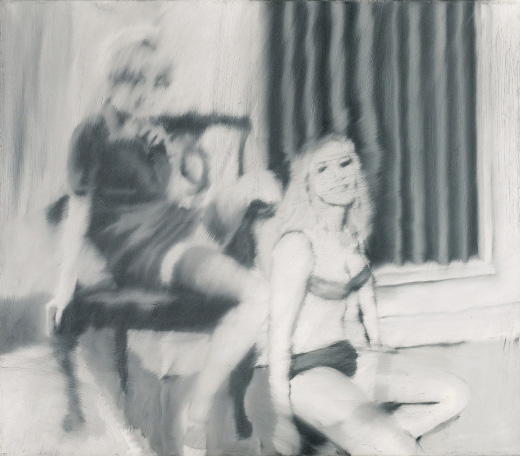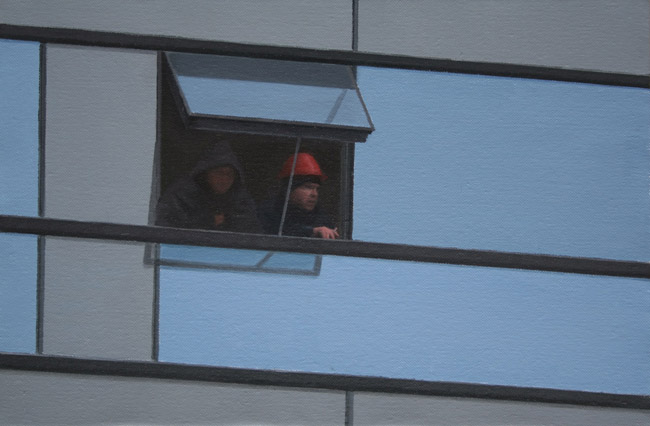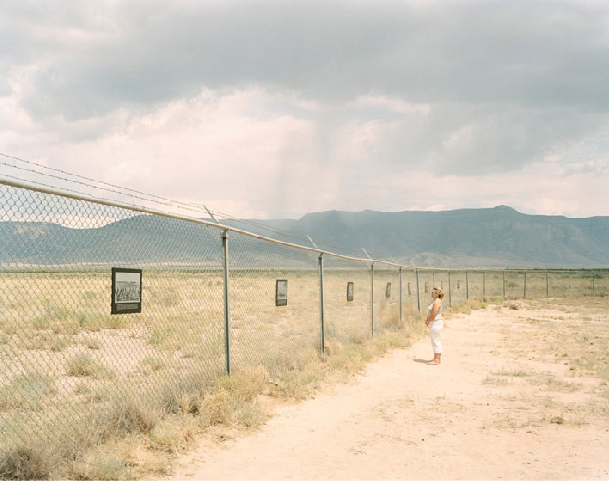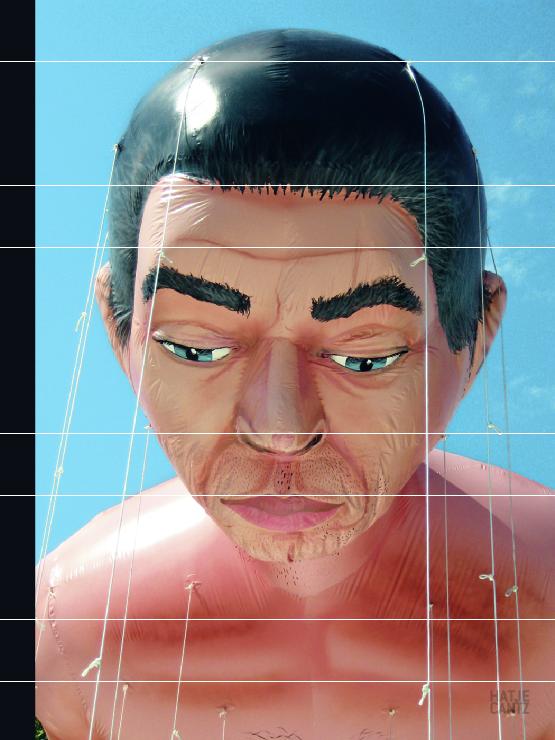
There is a linkage between capitalism, authority, and exploitation, and that linkage can best be described as instrumental rationality; a form of thinking, of logic, of reason. The same logic that demands control and domination.
Joseph Lamb recently wrote :
“President Obama candidly remarked in his State of the Union address that, “The greatest nation on earth cannot go from one manufactured crisis to another”. Stagecraft spectacles rehearsed from political pulpits are a ‘synthetic commodity’ passive listeners consume. The State of the Union illustrated a pep rally containing populist sentiment, and altering statecraft into a ‘pseudo-event’
“
Instrumental thinking concerns itself with only the measurable — with things one can weigh and describe. The evolution of visuality, a fact with a variety of causes behind it, is now almost totally synonymous with rationality. What can be measured, what you can “see”, is what is real. What is real is what is valued, and privileged above other forms of experience. The synthetic event is the by product of instrumental rationality. Standardized testing measures instrumental rationality. In other words, if you want to think logically, you must think visually, and you must think within the confines of this model for experience. The synthetic event means simply that the system of domination, predicated on instrumental rationality, creates a pre-vetted experience for the society as society.
The cultural result is a failure to “see” certain things in artworks. One result is that films with profound elimination of the mysterious, the one dimensional flat screen performance, or depiction of events (synthetic events at that) are validated. It’s not just the surface, it’s the absence of implied unknowns, the absence of unconscious traces, and really, the absence of historical traces for history is always in a sense mysterious and charged with ambivalence.
If history appears, it appears as kitsch. Nobody really believes Django Unchained is historically accurate, but a good many people don’t care. Accurate, not accurate, it’s all the same and THAT is the overriding sense of instrumental thinking: history is in the past, I can’t see it, I can’t *know* it, and therefore it is of limited use, and if the Ku Klux Klan was formed AFTER the civil war, and after the emancipation proclamation, and not before, it’s not really important in terms of how I can use it.

The Frankfurt School thinkers of course were sort of the first to connect this as a by product of the Enlightenment.
Or rather, they looked to understand the Enlightenment dialectically.
“this first thesis in Horkheimer’s claim: ‘Reason’s disease lies in its own origin, in the effort of man to have dominion over nature.’ Enlightenment rises under the sign of domination. Since the beginning, it ‘has always aimed at liberating men from fear and establishing their sovereignty,’ and its program was ‘the disenchantment of the world; the dissolution of myths.’ In other words, Enlightenment has been understood as an opposition and counterforce to myth: Enlightenment contradicts myth. Therefore, Enlightenment entrenches the knowledge of science that does not work any more ‘by the fortunate insight,’ but for the exploitation and dominion over a disenchanted nature. In the process of Enlightenment knowledge turns into power, and nature becomes reduced to ‘a substratum of domination.’ The Enlightenment functions according to the principle of identity: it cannot stand the different and the unknown: ‘What was different is equalized. ‘When there is no longer anything unknown. That determines the course of demythologization, of enlightenment’ which reduces all to ‘pure immanence.’ ‘Enlightenment behaves toward things as a dictator toward men, and it knows them in so far as it can manipulate them. In this process, ‘mimesis’ is displaced by power, which now turns into the ‘principle of all relations.
Alfredo Lucero-Montano

‘The permanent sign of enlightenment is domination over an objectified external nature and a repressed internal nature.’ Jurgen Habermas
So the myth gave birth to the corrective. Its useful to keep in mind that the Enlightenment was a corrective to Church dogma and repression. The desire to name, to explain, was already there.
The promise of the Enlightenment was liberation and autonomy. The result was the opposite.
Horkheimer
On the road to modern science, men renounce any claim to meaning.What is abandoned is the whole claim and approach of knowledge: to comprehend the given as such; not merely to determine the abstract spatiotemporal relations of the facts which allow them just to be grasped, but on the contrary to conceive them as the superficies, as mediated conceptual moments which come to fulfillment only in the development of their social, historical, and human significance
This has always seemed a significant paragraph to me. It branches off into Heidegger, and Merleau Ponty, as well as the other branch that became post modernism. And for me Post Modernism, or a good deal of it, and we would have to decide what we even mean by that term, has always operated very undialectically.

Within this logic lies the default setting of relativism; everything is just an opinion, a belief, subjective. This tendency lurked in a lot of post Marxist thinking (trots mostly), in which a tyranny of materiality was joined to the idea of granting the toleration of beliefs, as long as they were known to *only* be beliefs.
The progressive rationalized and instrumental world view at the same time stops the dreamwork of both the individual, and of the imagination of the society. As Adorno said, all objectification is a forgetting.
So, the synthetic event, the manufactured recreation of a false reality, is the new manifestation of myth. The new magical thinking of the highly rationalized society of the spectacle.
It is a good moment to return to Marx:
Labour is external to the worker – i.e., does not belong to his essential being; that he, therefore, does not confirm himself in his work, but denies himself, feels miserable and not happy, does not develop free mental and physical energy, but mortifies his flesh and ruins his mind. Hence, the worker feels himself only when he is not working; when he is working, he does not feel himself. He is at home when he is not working, and when he is working he is not at home.
Of course, alientation rapidly colonized notions of leisure and what “being at home” meant. The worker became a commodity. Leisure time was increasingly regulated and controlled…and leisure time activity managed. Concepts of *entertainment* reflect this, as does the rise of the weirdest word in English, *fun*.

The creation of needs, pseudo desires, was the next chapter in complete alienation.
Terms of proof, the jargon of junk science, the validation of beliefs (freedom, democracy, etc) only appeal to templates created by relations of power.

They Live, dr.John Carptenter, 1988
Horkheimer and Adorno saw the only hope in this tsunami of social domination in the “secret uptopia in the concept of reason”.
This is the role of art and culture. To make available the secret meaning in any number of various narratives of domination. For even within the most compromised form of scientific/corporate Capitalist reason there lurks the daimon of a forgotten past. Whether individual or collective, the trace elements of history, of non-objectified desire can be discovered in the midst of the Spectacle.
The role of labor of course has changed. From value as labor power to value as consumer to value as viewer — as circulator of image and creator of value in this circulating. We are distanced, alienated, from not just our work, but from ourselves. The effect of this is felt in the reductionist rationality of most corporate cultural product.
Layered over this comes another logic, the violence of Capital, of Imperialist aggression. For in a sense this is the blowback from such acute levels of alienation.

from LINH DINH:
Now, I have nothing against “shock” per se, or black humor, but we’re not talking about Celine, Artaud, Henry Miller, Charles Bukowski or Andy Kaufman, but simply crass idiocy. Loutish Limbaugh became so popular, he was asked to be a commentator on Monday Night Football.
Violence, always violence. From infancy, Americans are conditioned to enjoy violence, then lured or pressured to support it at every stage of life. Merely by voting, Americans sanction carnage against foreigners, and to have a healthy stock portfolio, one should also invest in mass murder. Even holding onto to a job can mean implicit or explicit participation gratuitous violence. Let’s say you’re an honest and mild-mannered cop, but if your colleagues were kicking a prone suspect, LAPD style, you’d arouse suspicion and ridicule for not joining in. What are you, a snitch? Who do you think you are, Christopher Dorner? And in war, massacres and mass rapes are initiation rites and bonding rituals, what bonafide heroes indulge in, for to abstain is to be a queer or pussy. What are you, a snitch? Who do you think you are, Bradley Manning?
With preemptive wars, drone hits, extrajudicial killings and torture, illegal violence has become institutionalized in the USA, and as we normalize such outrages against humanity, we become more corrupt on every level, for if one can justify greed-driven, random or even recreational or therapeutic killing, what Limbaugh called “letting off steam” in regard to Abu Ghraib, then one can justify any other immorality.

The filmic expression of the scrubbed hyper rationalized logic of white supremicism and Imperial hubris is the Speilberg “history” lesson, Lincoln. A moribund flat lifeless and turgid bit of hagiography, its greatest virtue is in the absolute tyrannical imposition of one single dimension to its reality — the world according to IBM or DOW or General Dynamic and Boeing…..that is the universe in which this “prestige” product lives (or at least gives the appearance of living).
Instrumental thinking homogenizing everything, and alienates and reifies everything. The foundational aspect of post Enlightenment rationality is an amnesia of genuine unity with nature —- and here one must remember that the word *nature* is colonized by the Sierra Club and new age environmentalists. The kistch version of nature. The nature of pre-rationality, of myth, places an emphasis on the unseen, the fleeting, the mysterious. The oracles of Delphi and elsewhere answering questions not asked. In art, in narrative, the de-unifying (disabling of the instrumental) comes in various forms, in highly elliptical structures or in the fragment that withstands all rationality. Not an easy thing, and the co-opting of this by the ersatz court eunuchs (Lynch or Wilson, or Abramovic, et al), those who serve openly the interests of capital (no accident all are wealthy is it?). The genuine creation must tap into the shadows of those secret meanings hidden beneath the subtext (or wherever they might hide). They must make present a desire lost from collective memory, for in that glimpse lies a groundwork for real liberation.
Guy Debord back in ’67…
With the generalized separation of the worker and his products, every unitary view of accomplished activity and all direct personal communication among producers are lost. Accompanying the progress of accumulation of separate products and the concentration of the productive process, unity and communication become the exclusive attribute of the system’s management. The success of the economic system of separation is the proletarianization of the world.

From Dialectic of Enlightenment:
‘On one hand, the growth of economic productivity furnishes the conditions for a world of greater justice; on the other hand it allows the technical apparatus and the social groups which administrate a disproportionate superiority to the rest of the population. The individual as wholly devalued in relation to the economic powers, which at the same time press the control of society over nature to hitherto unsuspected heights’
Managment, organization, efficiency. The Enlightenment gave birth to the instrumental by having the seeds of self domination already present. Nature must be returned to a pre-positivist realm of, not the irrational, but of the uncharted, the cosmic and immeasurable, but that is only possible if the structures of domination, the logic of control, that fact based paradigm on which the modern individual believes he exists and would perish without, cease.
Horkheimer & Adorno again….
One of the peculiarities of liberal democracy, and its relativism, is that the anti-Semite is condemned by the bourgeoisie but never totally — the victim might have to take some of the blame too! This is a typical combination of truth and sophistry, again just as in paranoia.
This is the methods over ends. This is the real proceduralism, the presentation of a faux tolerance, focused on the immediate factual issues, expressive of a value system believed to be fair and just. That it results in the opposite can be seen countless times. A black President presiding over the largest prison population increase in U.S. history, a prison population disproportionately black. The contradictions of the Spectacle are everywhere, and they are effectively hidden in the validated product of corporate cultural hegemony. There is no investigation of race or slavary in Django the Stupid —- there is nothing of a real racial memory at work, of real suffering, or anything to suggest the far reaching and long lasting effects psychologically and ideologically of slavery, nor is there even a cursory glance at the reasons for it.

This is a fascinating passage….and opens to all sorts of other related topics….Horkheimer & Adorno again..
Theories of punishment are saturated by bourgeois conceptions — thus modern prisoners conform exactly to the notion of the monad [the isolated thinking individual of classic bourgeois thought], and prisons are ‘an image of the bourgeois world of labour taken to its logical conclusion’. A history of punishment is developed so that crime was once seen as an illness, but is now a social force. There is a remarkable similarity between criminals, respectable businessmen, and fascists: ‘The mass murdering Fascist appear as the pure essence of the German manufacturer, different from the criminal only in that he enjoyed power’.. Society itself has become a kind of prison –‘The punishment of imprisonment is as nothing when set against the social reality in which we live.”
The rise of individuality can be seen as exactly its opposite. The constant inversion of meaning if the prevailing strategy of this system of social domination and control. Call it the Spectacle, or advanced capital, but the synthetic event, the insistance on consensus and most importantly on blindess is what is before us. Blind and deaf and numb. Medicated to be visibly happy, regulated, modulated, but beneath the Melleril and iPhones lurk the madness and anxiety of never knowing what you want, never knowing if you’re happy.
I once had an old girlfriend who said to me, “you know, I never know when I’m happy and I never can tell when I’m sick”.

The artist must always, today, be part educator. The creation of audience is almost more important than other creations. The desire to rule is partly self hatred. The fawning over rulers is a sign of self hatred as well. Remembering is the starting point. You cannot know if you are sick until you remember…..for when that happens, the pointlessness of concepts such as “happiness” will start to yeild real liberation.
There is certainly reason to believe new movements of aesthetic resistence are forming, however. That a film like The Master managed to get made is encouraging, and there are a number of small achievements in film surfacing regularly. I was thinking of Tadeusz Kanter, again, recently …. as I pondered the barren landscape of US theatre. For Kanter exemplified a certain almost priestly relation to his work. Peter Brook to a lesser extent does the same.

Kanter
It is the sensibility you recognize and feel, and recall — and not any specific work, or its meaning or the decoding. With Kanter, in a sense, it was always the same work anyway. But that is true of most great artists. I think the first setting on the dial is *we are not selling you anything*. Not ideology, not tickets at inflated prices, not the demand to agree. If there is memory, then once senses it. It is something you sense even if it’s the first time you sense it.
We remember, even if we don’t.


John,
What’s the source of the Linh Dinh excerpt you quoted? His point about insidious conditioning is quite right & even more disturbing given the colossal unawareness of the conditioning.
As much as I loathe Tarantino, I find Lincoln more troubling. The latter is regarded and sold with hushed reverence & piety as History; the very thing we should be showing to the children. At least Django is basically offered as pop “entertainment”, however wretched. Lincoln is akin to the simply indefensible Silver Linings, which is presented as deep exploration of “mental illness” when, in fact, it’s as profound on this issue as James Bond is about espionage & feminist theory.
yeah chris…………agree. There is a critic at asia times who said a smart thing ….that Lincoln was made to be a way of showing children what history means. And to think that opening scene hasnt been pounced on as so astoundingly racist is beyond me……….the great white father speaking to his two black , adoring, children. Stunning.,
This is great John: “The rise of individuality can be seen as exactly its opposite.” And your suggestion that the artist must educate (as an antedate?) feels right.
I also appreciate the comments about Lincoln. I saw it a few weeks ago and find it very troubling that, whenever it’s mentioned, I can’t seem to remember the movie at all. It’s like a foggy dream. Yet I watched Silent Light around the same time and was often bewildered and even bored (and alternately amazed and transported… especially by the end) and could probably tell you, scene by scene, the entire film. What’s the difference?
CK